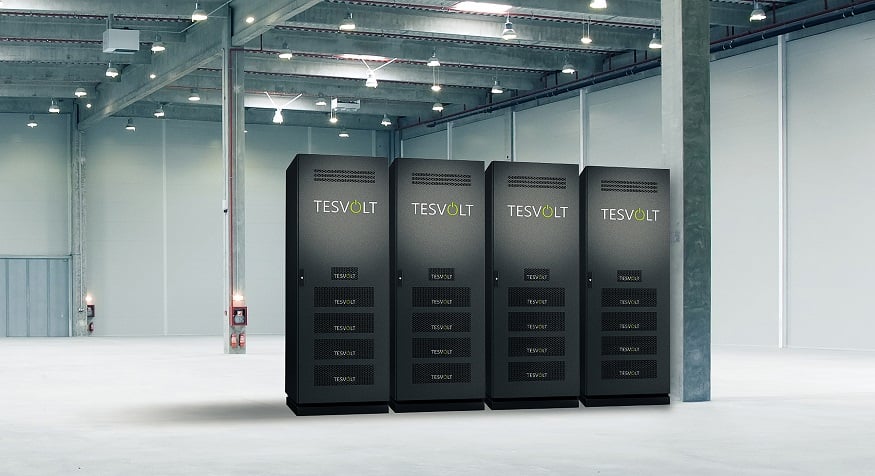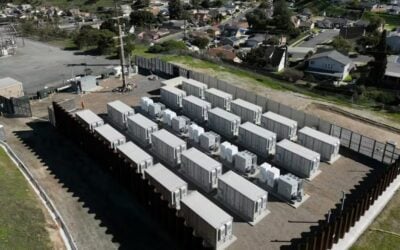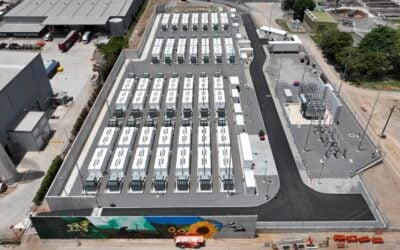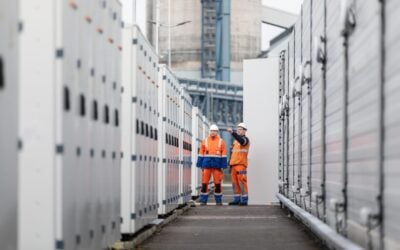
The race to build Europe’s first lithium-ion energy storage system ‘Gigafactory’ could be won by Tesvolt, as the German manufacturer announced a “multimillion-euro investment” in production lines this week.
Promising fully carbon neutral production of the company’s battery energy storage systems, which have been used both on and off-grid in more than 1,000 projects already, Tesvolt’s factory will be “fully supplied by solar energy”, the company claims.
This will include a 200kWp PV system to power offices and system production lines, paired with a 350kWh Tesvolt energy storage system. Heat pumps using a natural refrigerant will mean the facilities’ heating also comes from solar. Mechanical engineering company teamtechnik will fit out the factory’s semi-automated production line. The facility will have an annual production capacity of over 1GWh when completed.
Tesvolt’s battery systems were recently installed at Britain’s largest subsidy-free solar farm to date, with the energy storage thought to be a key part of the project’s business plan. Similarly, Tesvolt said it is “financing its multi-million Euro investment in the gigafactory without any outside funding”, although it is accepting a small amount of EU support worth 10% of the cost.
Try Premium for just $1
- Full premium access for the first month at only $1
- Converts to an annual rate after 30 days unless cancelled
- Cancel anytime during the trial period
Premium Benefits
- Expert industry analysis and interviews
- Digital access to PV Tech Power journal
- Exclusive event discounts
Or get the full Premium subscription right away
Or continue reading this article for free
The company did not give a timeline for completion of the production lines, although it says 12,000 sqm of floor space will be ready next month and that by the final phase of construction the production space will total 20,000sqm. Tesvolt expects employee numbers to roughly double by then from today’s workforce of 60. As with the majority of its competitors, Tesvolt does not make its own battery cells and has sourced nickel manganese cobalt (NMC) cells from Samsung SDI in the past.
“The world market for stationary energy storage systems has already reached a total capacity of 16GWh. Europeans are calling for an end to harmful coal-fired power plants and diesel scandals. They want a future free of environmental disasters. We want the gigafactory to be our contribution to reaching this goal, making clean and affordable energy possible anywhere in the world,” Tesvolt co-founder and CEO Daniel Hannemann said.
Global giga-plans springing up
Currently, Swedish start-up company Northvolt is trying to get a gigafactory built in Sweden. In 2018 it agreed a financing facility of up to €52.5 million (US$64.8 million) from the European Investment Bank (EIB) to support Northvolt’s pilot demonstration facility. Meanwhile in Australia, a feasibility study is underway for a large-scale factory in Townsville, Queensland, while one of the partners in the consortium working on that project, Magnis Resources, is also part of Imperium3, a consortium of five global technology companies also looking to build a gigafactory in New York. Another consortium, TerraE Holdings, formed by the Germany-based KLIB (Kompetenznetzwerk Lithium Ionen Batterien – ‘Competence in Lithium-Ion Batteries’) group, which includes the likes of Daimler, Bosch, 3M, Manz, Wacker, Kuka, Varta and Litarion, is also investigating the building of a European gigafactory, again with Magnis Resources involved.
Elsewhere in the world, India’s national Energy Storage Alliance has told Energy-Storage.news that it expects “multiple” gigafactories to spring up in the country over the next few years. Tesla’s massive production facility in Nevada, which of course popularised the term ‘gigafactory’ as it began construction in 2015, aims to produce 35GWh of batteries per year by 2024 – which at the time of its announcement was a higher figure than all of the lithium batteries produced in the world.
South Korea and Japan remain the world’s biggest manufacturers of lithium-ion batteries, with China catching up. China predominantly makes lithium-iron phosphate (LFP) batteries, rather than NMC, which a recent blog on the China National Energy Storage Alliance website said is much more price competitive. LFP batteries from China come in at around 30% cheaper than those from overseas providers, CNESA said.
“It is very likely that China’s manufacturing capacity will allow the country to become the leading supplier for the global battery and energy storage industries, much as the country has done for the solar PV industry,” the China National Energy Storage Alliance blog said.





